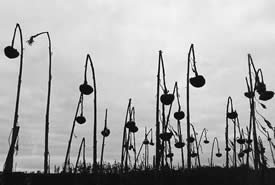"El sueño de un curioso"
A F.N. *
Conoces como yo el sabroso dolorY de ti hacer decir: "¡Qué hombre más extraño!"
Iba a morir y en mi alma amorosa
había deseo mezclado con horror: un mal muy singular.
Angustia y esperanza, sin mezcla de ironía.
Al irse vaciando aquel fatal reloj
mi tortura se hacía más honda y deliciosa;
mi pecho se arrancaba del mundo familiar.
Era como ese niño que ansía divertirse
y que odia el telón lo mismo que un obstáculo.
Pero al fin la verdad se reveló desnuda.
Me morí sin sorpresa y la terrible aurora
me envolvía. ¿Y qué? ¿Era tan sólo eso?
El telón se había alzado y yo esperaba aún.
* Felix Nadar fotógrafo amigo de Baudeleire. A el le debemos excelentes fotografías del poeta.




